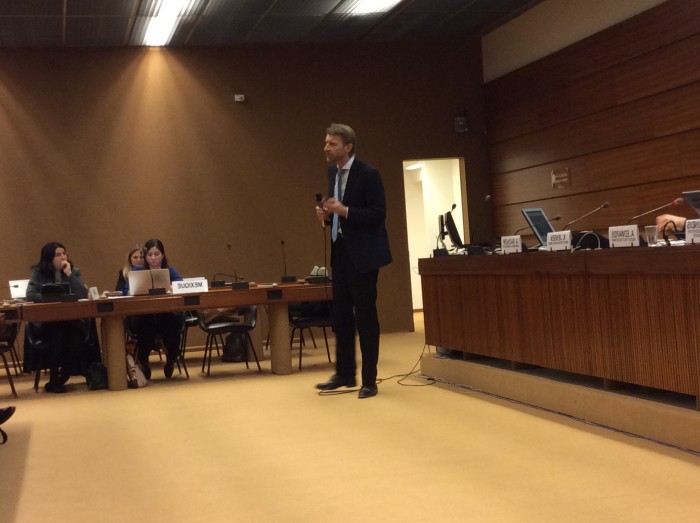7th March 2016 Geneva, Switzerland
More is Less

Aftershave. Make-up. Back hair. At some point during our adolescence we realise that less is usually more and adjust our personal grooming behaviour accordingly. Despite my awkward formative years, even I managed to understand that aftershave was not to be applied by the bottle (though I never worried much about my make-up).

The Council turns 10 this year, and still has time to change its ways. Sadly for the time being, it is acting like an over enthusiastic teenager on a first date, overwhelming us all with too much of everything. Everyone needs to feel that they can have their human rights priorities addressed at the UN. But the knee-jerk way of getting attention at the Council is by asking for a report, then setting up a panel discussion and finally, a little further down the road, creating a new Special Rapporteur. The end result is that everything gets lost among everything else. Reports don’t get read, no one has the time to devote to engaging meaningfully in panel discussions and there are so many Rapporteurs that the system can’t support them all. For delegates, Council sessions have become a question of survival, rather than a forum for addressing the most pressing challenges of the day. More is definitely less.
This session, despite the late nights we’ve already inflicted on ourselves, there are already proposals for new panel discussions to mark 10 years since the Council was set up and the 5 year anniversary of a Declaration on Human Rights Education. However worthy an issue may be, I’m really not convinced that marking an anniversary is the best use of the Council’s time, especially at the five year stage. I know it feels like it matters when you turn five, but I it seems a lot less of a landmark from the vantage point of turning 40.
The more overloaded the plenary gets, the less time there is for delegates to attend some of the excellent side events which NGOs and states put on. This week I made it to an impressive event put on by the Convention Against Torture Initiative, a coalition of states which are aiming at global ratification and implementation of the UN Torture Convention by 2024. Norwegian police detective Asbjorn Rachlew gave a fascinating presentation on reducing torture by teaching fellow police professionals about investigative interviewing. Based on techniques he learnt in the UK and brought home to Norway, he now trains police forces around the world on how to obtain reliable evidence through interviewing techniques so that police do not rely on confessions obtained through torture and ill treatment to secure convictions. It was inspiring, practical and accessible, and exactly the sort of real world experience the Council should be hearing about.
The Council finished off its busy first week by hearing from the UN’s experts on Genocide Prevention, Adama Dieng and on Human Rights Defenders Michel Forst, who both have essential roles with the UN system. Dieng posed some difficult questions, asking why it was proving so difficult to prevent atrocities when the international community had the legal tools and capacity to do so. He drew attention to the alarming surge in violations in Burundi as well as brutal attacks on civilians in the Central African Republic. Michel Forst paid tribute to all human rights defenders killed in 2015, particularly Berta Caceres, the human rights and environment activist murdered in Honduras last week. Forst was rightly critical of those states who refuse to grant him access and referred to alarming cases of reprisals against those who cooperate with the UN human rights system. He singled out Iran and Russia for criticism for harmfully muddying the distinction between Human Rights Defenders and terrorists. Regrettably the a growing number of countries are seeking to restrict the ability of human rights defenders and civil society more widely through questioning their legitimacy, restricting access to finance or denying them legal status. Mr Forst has a crucial role to play in keeping these issues in our focus.

Week 2 promises to be frantic as delegations go about what they do best- negotiating huge amounts of resolutions at all hours of the day. But However much we may disagree in the UN’s underground rooms, I’m sure there’ll be one common factor that will unite us in the weeks ahead – the fact that we all need more rest. Where sleep is concerned, less is unquestionably less.
Great blog by Bob. You point to some important issues regarding the overloaded agenda of the Council. It acutally reduce our ability in the end to be effective. Your point on human rights defenders and the theats they are under, is very timely. We need people like Specialrapporteur Frost to speak out on their protection needs. Thanks!
Great piece Bob. I wish I could attend the Side Event and listen the presentation on interrogation techniques… I am sure we could use some of them to get information out form our fellow colleagues.
I agree with you, too many celebrations kill the celebration. The same happens with panels, resolutions, reports and mandates. The more there are, the more diluted they become.
Another great blog Bob. Full of insight. I agree with you on the increasing number of UN reports. Who can possibly read them all? I also spotted that you’ve changed your biog info – congrats on the MBE!
Thanks Richard. My wife thinks it stands for Mess Beyond Extreme, in recognition of domestic achievements.